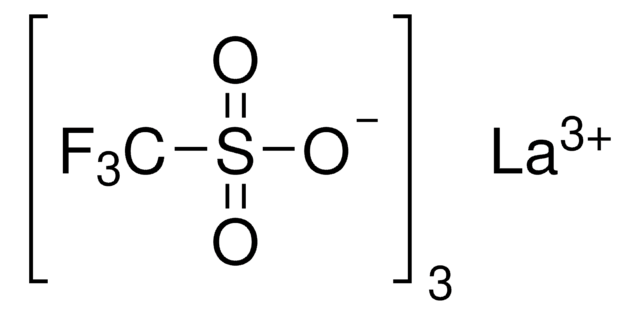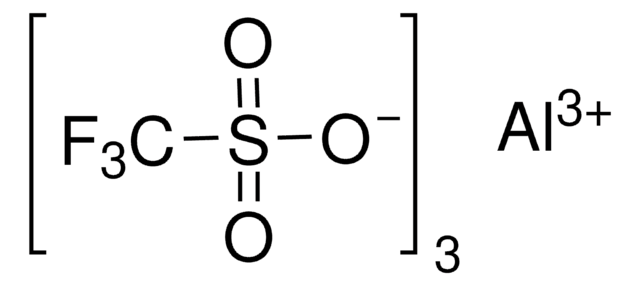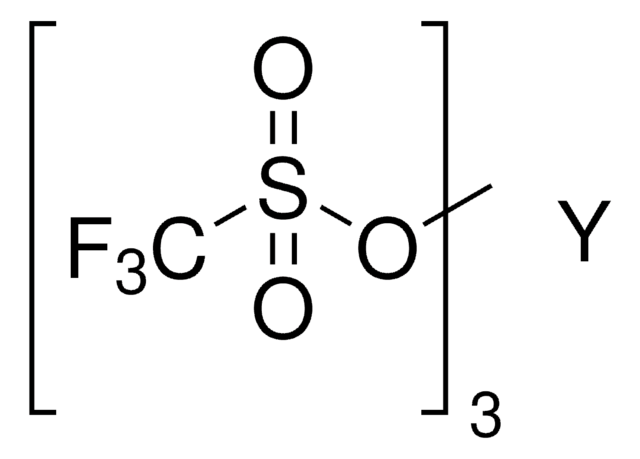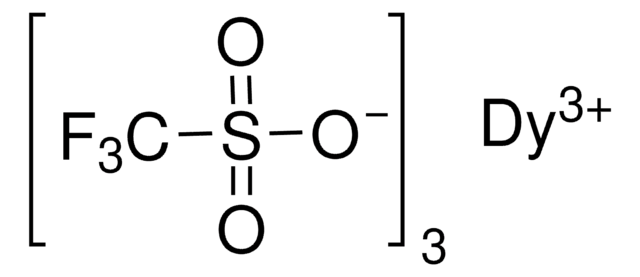405329
Ytterbium(III) trifluoromethanesulfonate hydrate
Yb 25-28 % (approx.)
Synonym(s):
Yb(OTf)3, Trifluoromethanesulfonic acid ytterbium salt, Ytterbium(III) triflate
About This Item
Recommended Products
composition
Degree of hydration, 1-2
Yb, 25-28% (approx.)
reaction suitability
core: ytterbium
reagent type: catalyst
SMILES string
[H]O[H].FC(F)(F)S(=O)(=O)O[Yb](OS(=O)(=O)C(F)(F)F)OS(=O)(=O)C(F)(F)F
InChI
1S/3CHF3O3S.H2O.Yb/c3*2-1(3,4)8(5,6)7;;/h3*(H,5,6,7);1H2;/q;;;;+3/p-3
InChI key
BUJKNFNMGRYZBV-UHFFFAOYSA-K
Looking for similar products? Visit Product Comparison Guide
Related Categories
General description
Application
- Synthesis of the dihydropyrimidine (DHPM) derivative monastrol, by Biginelli cyclocondensation.
- Cross-aldol reaction between ketone and aldehyde.
- Synthesis of β-keto enol ethers.
- Synthesis of deoxypenostatin A in a novel, stereoselective intramolecular Diels-Alder reaction.
Signal Word
Warning
Hazard Statements
Precautionary Statements
Hazard Classifications
Eye Irrit. 2 - Skin Irrit. 2 - STOT SE 3
Target Organs
Respiratory system
Storage Class Code
8A - Combustible corrosive hazardous materials
WGK
WGK 3
Flash Point(F)
Not applicable
Flash Point(C)
Not applicable
Personal Protective Equipment
Certificates of Analysis (COA)
Search for Certificates of Analysis (COA) by entering the products Lot/Batch Number. Lot and Batch Numbers can be found on a product’s label following the words ‘Lot’ or ‘Batch’.
Already Own This Product?
Find documentation for the products that you have recently purchased in the Document Library.
Customers Also Viewed
Articles
Friedel-Crafts acylation with Lewis acid catalysts forms monoacylated products via electrophilic aromatic substitution of arenes.
Friedel-Crafts acylation with Lewis acid catalysts forms monoacylated products via electrophilic aromatic substitution of arenes.
Friedel-Crafts acylation with Lewis acid catalysts forms monoacylated products via electrophilic aromatic substitution of arenes.
Friedel-Crafts acylation with Lewis acid catalysts forms monoacylated products via electrophilic aromatic substitution of arenes.
Our team of scientists has experience in all areas of research including Life Science, Material Science, Chemical Synthesis, Chromatography, Analytical and many others.
Contact Technical Service










